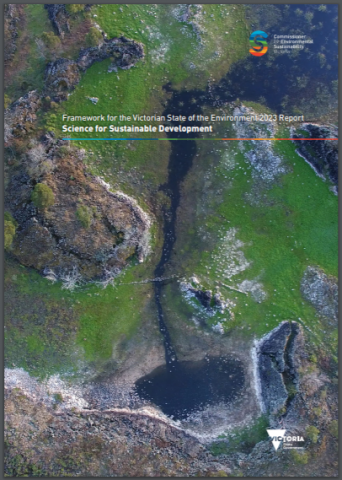On 16 June 2020, the Minister for Energy, Environment and Climate Change, The Hon. Lily D’Ambrosio MP, caused the tabling of the Commissioner for Environmental Sustainability’s Framework for the Victorian State of the Environment (SoE) 2023 Report, Science for Sustainable Development.
Science for Sustainable Development is an important milestone in the continuing maturation of environmental reporting in Victoria. It builds on the work of the SoE 2018 report and is the guiding framework for all reports (five in total) that will be prepared by the Commissioner for Environmental Sustainability as part of the 2023 State of the Environment reporting cycle.
Central to the framework is the continuing focus on building baseline, environmental condition reporting for Victoria and sub-regions, coupled with the additional synthesis using the United Nations Sustainable Development Goals (SDGs) to better analyse the entire system and the interlinkages between economic, social and environmental considerations.
“Using the SDGs individually and collectively as an organising framework will push SoE reporting beyond previous cycles,” says Commissioner for Environmental Sustainability Dr Gillian Sparkes. “I believe that the SDGs provide a unique organising framework to better define and quantify the concept of ecologically sustainable development and animate the objectives of the CES Act 2003.” Our overarching aim is to provide Victorians with access to accurate, up to date science and meaningful analyses on Victoria’s environmental health to inform practical action.
The Victorian SoE 2023 will continue to assess the environmental condition of the baseline indicators from SoE 2018 – in terms of status, trend and data quality (measured across 170 indicators across 13 themes). It will also measure Victoria’s progress against relevant SDG targets and aim to determine (through predictive models that also explore the interlinkages between economic, social and environmental targets) those interventions that can improve progress towards ecologically sustainable development.
Says Dr Sparkes: “The SoE 2023 will build on lessons learnt and continue to highlight the important roles of science, data and community in decision-making for ecologically sustainable development.”
The Victorian SoE 2018 was the first attempt in Australia to apply the SDG framework to environmental reporting at a sub-national level. The SoE 2018 reporting process ushered in new ways of working with CES stakeholders to co-design and enhance the value of independent science reporting. It laid the foundation for the Science for Sustainable Development framework, and the SoE 2023 will continue to align environmental reporting to the SDGs at the target level, measured against local indicators and priorities. The Framework builds on the method adopted for the SoE 2018; and also commits the Commissioner for Environmental Sustainability to incorporating spatial data, and where possible, the adoption of the UN System of Environmental-Economic Accounts into environmental condition reporting for Victoria.

Cover image: Tae Rak Channel and holding pond. Budj Bim Cultural Landscape. Photo credit: Tyson Lovett-Murray and Gunditj Mirring Traditional Owners Aboriginal Corporation.
Dr Sparkes acknowledges the many involved to produce this Framework including the Commissioner’s Reference Group, “Together we have successfully developed baseline condition reporting for Victoria over the past five years and are now developing the SDGs as an additional and broader part of the story-telling process through the Victorian State of Environment 2023 reporting framework, Science for Sustainable Development. We remain committed to preparing best-practice science-based reports to inform policymakers, scientists and the wider Victorian community. There is so much more work to be done.”
Publication
Quick fact
Did you know that Victoria is one of only two jurisdictions in Australia (the other being the ACT) with an independent Commissioner charged with periodic State of the Environment reporting? Read about Victoria’s Commissioner for Environmental Sustainability.
